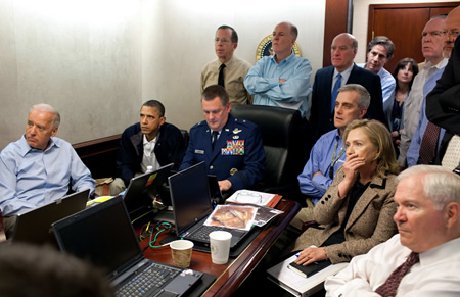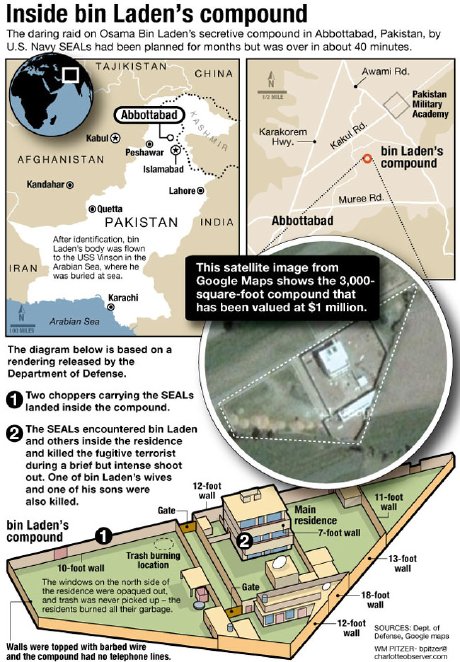Adil Najam
What do Pakistanis think about how Osama Bin Laden met his end, the implications of that end?
There are as many opinions on what happened in Abbottabad as there are Pakistanis. Maybe more. But there is no sense whatsoever where the government of Pakistan (or any of its major institutions) stand on what happened – or stood when it was happening. For 36 hours now the world has been waiting to see what Pakistan does and says – the silence and incoherence from Islamabad has not just been embarrassing, it has been damning. Finally, key institutions in Pakistan have begun trying to piece a narrative together – unfortunately it is way too late and the narrative itself rather lame.
When I put up a short post on Osama Bin Laden’s death soon after the news broke, I had hoped that in time more details would become available and we would get more clarity on what happened and how. We do now have more detail. But certainly not more clarity. The story about what happened in Abbottabad now lives in Spin-abad. Everyone – from governments, secret agencies, the media, the Twitterati, and your spinster aunt – are taking a spin. Many are taking multiple, sometimes contradictory, spins. Everyone except the Pakistan government.
That, of course, is a surprise – not only because the Pakistan government does have a lot of explaining to do, but even more because it is in the interest of the Pakistan government to do that explaining itself rather than have someone else do it for them. Yet, up until it was already too late, Pakistan seems to have abdicated that responsibility. In fact, President Barack Obama, Secretary Hillary Clinton and Senator John Kerry seemed to be making that (half-hearted) case for Pakistan more than anyone in authority in Pakistan. Given that President Obama had informed President Zardari before the speech from the US President, one would have assumed that the Pakistan President and his media handlers would have their own statement ready to go on the air minutes, if not seconds, after President Obama’s speech. This is not about spin and PR, this is Diplomacy 101: Own and define the narrative as soon and as clearly as you can before someone else defines it for you – especially if the narrative is likely to be unfavorable.
But the narrative, itself, is not the core of Pakistan’s challenges. The problem is the facts on the ground and the government’s inability and unwillingness to explain them. Pakistan is used to the feeling of the world ganging up on it. But there are good reasons for the questions being asked of Pakistan by the world today. There are even better reasons for the questions being asked of Pakistan by Pakistanis today. Whether the government comes clean to the world or not, it is vital that it respond to Pakistanis. The first is a matter of national image (no trivial issue, that), but the latter is a question of citizen trust in national institutions (an existential element of statehood).
The fact is that there is a Pakistan case to be made on this issue. And it needs to be made to Pakistanis much more than to the rest of the world. It is a case that forcefully stresses that a world, and a Pakistan, without Osama Bin Laden in it is a vastly better world than one with him in it – this is a villain who orchestrated events that have left more than 30,000 Pakistanis dead in extremism and terrorism. It is a case that legitimately highlights the sacrifices that Pakistan and Pakistanis have, in fact, made in the fight against terrorism. Most importantly, it is a case that honestly analyzes what happened in Abbottabad – it is not a surprise that Osama Bin Laden was found in Pakistan and in a large urban area (just like nearly every other major Al Qaida figure captured) – but an explanation is owed on why Pakistani intelligence failed to make the connections that led to him, an explanation is owed on exactly what Pakistan’s official role in the final operation was (or was not), and an explanation is owed on exactly what Pakistan’s strategy on countering terrorism is, who is running it, and why it is not working well enough or fast enough.
In a country and an ‘establishment’ as divided as Pakistan, this cannot be an easy conversation; it is not supposed to be. It is time to ask honest and tough questions of everyone. It has long need a necessary conversation; now is the time to have it.






















































Excellent article. I wish Zardari and anyone in his team coudl think as straight.
Zardari did post an opinion column in Washington Post today:
http://www.washingtonpost.com/opinions/pakistan-di d-its-part/2011/05/02/AFHxmybF_story.html
Not enough in my opinion. Vultures are out for the kill today. Everywhere you look, it’s selective opinion targeting Pakistan without any facts to back anything up.
According to the American announcement, Osama bin Laden was not killed DURING the firefight but executed with a shot in the head AFTER he had been taken into custody. Like CIA kingpin K. Subrahmanyam’s fake death, his death — in preparation for a withdrawal from Afghanistan — is a consequence of India having prepositioned five to six nuclear weapons in various cities/countries for the nuclear destruction of New Delhi and then the coast-to-coast destruction of the United states (see below) and may be similarly fake.
I am India’s expert in strategic defence and the father of India’s strategic program, including the Integrated Guided Missile Development Program and in my blog titled ‘Nuclear Supremacy For India Over U.S.’, which can be found by a Yahoo search with the title, I have shown that all terrorism and insurgencies in the Indian subcontinent and in much of the rest of the world are sponsored by the C.I.A. Both Pakistan’s ISI and India’s RAW function as branches of the C.I.A. and participate in terrorism and insurgencies throughout the Subcontinent, under direction of the C.I.A. The goal of the U.S. invasion and occupation of Afghanistan and partial occupation of Pakistan is eventual occupation and overt colonial rule over the Subcontinent as a whole; India is already under covert CIA rule. To end this, India has said that five to six nuclear bombs have been prepositioned in various cities/countries such as New Delhi, Washington and New York — see my blog — for the nuclear destruction of New Delhi and then the coast-to-coast destruction of the United States.
Indian media people have been covering the white man’s wedding as if he is India’s prince. How many stories have you carried about India’s sovereign (see my blog above) who is also the most intelligent, most handsome man on Earth whose toe-nail clippings are worth more to India and the world than the rest of the billion-plus Indians combined? RAW has been putting out a breathless story on the white man’s wedding, in the Times of India, NDTV, etc., about every five minutes just as it promotes the AIDS woman and her gang-rapist son. It is all part of maintaining white rule over India (see ‘What You Should Know About RAW’ in my blog above).
India’s emperor, Bahadur Shah Zafar, was kept in exile while the British ruled India just as India’s sovereign is being kept in exile while the CIA rules India. Tens of millions of Indians killed by the British in just the ten years after 1857 — depopulating entire regions so there weren’t any men left to till the land — and many more right up to 1947 is how you generate love and admiration for conquerors — Americans doing the same in Iraq, Afghanistan, etc. call it ‘pacification’ — loved and admired by one Swapan Dasgupta who wrote a column admiring me as “Quick Gun Murugan” about twenty years ago at which he was recruited by CIA-RAW. India will depopulate enemies — to hell with love and admiration — with nuclear bombs.
Satish Chandra
Pakistan is silent because it has skeletons to hide.
Thank you for a thoughtful and well written response, it is very much needed from Pakistani voices.
Do you have any thoughts about what will happen to this compound? Is it silly to imagine that this becomes an opportunity to memorialize Pakistan’s sacrifices in the War on Terror? Those unnecessary deaths are real whatever we find out about the role Pakistan’s military and intelligence apparatus. Is it naive for me to hope that one day when I visit Pakistan again, I can visit the Abbottabad War on Terror Memorial?